top of page

Exploring the Vibrant Wonders of South Africa: A Journey Through Diverse Landscapes and Cultures
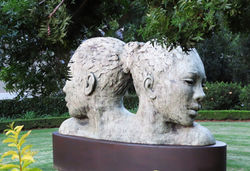 Beautiful Laurence Graff Sculpture on the grounds of the Delaire Graff Lodges and Spa in Stellenbosch |  Selfie taken while relaxing in the afternoon |
|---|
 A metal sculpture of swallows decorates the ceiling at the Indochine Restaurant, an Afro-Asian experience. |  Sharing a meal together in the evening |
|---|
 Here we are having our photo taken at the historical Cape of Good Hope. The Cape of Good Hope marks the point where a ship begins to travel more eastward than southward. |  The strategic position of the Cape of Good Hope between two major ocean currents, ensures a rich diversity of marine life. There is a difference in the sealife west of Cape Point and that to the east due to the markedly differing sea temperatures. |  With its diverse habitat from rocky mountain tops to beaches and open sea, the Cape of Good Hope is home to at least 250 species of birds. |
|---|---|---|
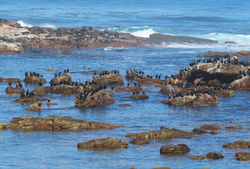 Perfect Waterfowl home on the rocks |  Shannon taking a bit of a hike |  The Cape of Good Hope is an integral part of the Cape Floristic Kingdom, the smallest but richest of the world's six floral kingdoms. This comprises a treasure trove of 1100 species of indigenous plants, of which a number are endemic (occur naturally nowhere else on earth). |
 Coastal view |
 The Eland is the largest antelope in Africa and the second largest in the world. |  Within Table Mountain National Park, only the attentive or lucky visitor may see the Cape Mountain Zebra, usually in Smitswinkle Flats. |  Chacma baboons are the mammals most intimately associated with the cape of Good Hope. There are 11 troops consisting of 375 individuals throughout the entire Cape Peninsula. The baboon population on the Cape is critically endangered due to habitat loss, genetic isolation, and conflicts with humans. |
|---|---|---|
 Ostriches at the Cape |  Female Ostrich |
 Cape Town is South Africa's oldest city. It was founded by the Dutch East India Company as a supply station for dutch ships sailing to East Africa, India and the Far East. |  Colorful photogenic hippo sculpture in Cape Town | 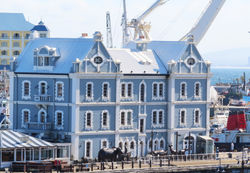 Beautiful hotel right on the water |
|---|---|---|
 Hotel at the base of Table Mountain |
 Franschoek has an interesting history. In 1685, the French King, Louis XIV, banned Protestantism in France. Hundreds of people were forced to leave their country. In 1688, almost 300 French Huguenots arrived at the Cape of Good Hope by ship. The valley soon became known as Franschoek (French Corner in Dutch). Many of the French Huguenots that arrived were highly trained as blacksmiths, carpenters, tailors and merchants. Some of the men came from wine-producing regions and possessed specific skil |  South African wine has a history dating back to 1659 with the first bottle being produced in Cape Town by its founder and governor Jan van Riebeeck. Initially wine production was intended to ward off scurvy amongst the sailors during their voyages along the spice route to India and the East. |  Grapes at the base of the mountain |
|---|---|---|
 Perfect climate for wine grapes here |  The beauty of Franschoek |
 On the tram heading up to Table Mountain |  The main feature of Table Mountain is the level plateau approximately 2 miles (three kilometers) from side to side edged by steep cliffs. The plateau, flanked by Devil's Peak to the east and by Lion's Head to the west, forms a dramatic backdrop to Cape Town. This broad sweep of mountainous heights, together with Signal Hill, forms the natural amphitheater of the City Bowl and the Table Bay harbour. |  Just before heading up on the tram |
|---|---|---|
 The tram car |  View on the way up |  More of the expansive view |
 Heading up in the rotating tram car |  On our way |  You can see where we started from here |
 The Rocky hillside |  Arrival point |  At the top |
 Looking down on the city |  View of the water |  Check out how the waves come in |
 Looks like a Van Gogh painting |
 Beautiful ocean water at Boulder Beach |  King of the Rock! | 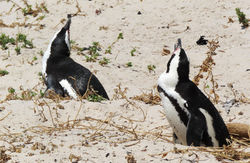 Boulders Beach forms part of the Table Mountain National Park. In 1982 a colony of African penguins settled here. These African penguins are found only on the coastlines of South Africa. They are currently on the verge of extinction and under the protection of the Cape Nature Conservation. Although being set in a residential area, it is one of the few sites where this vulnerable bird can be viewed at close range, wandering freely in a protected, natural environment. From just two breeding pairs |
|---|---|---|
 Natural African penguin habitat |  Up close and personal |  African Penguin |
 The houses in the background have quite a view of penguin behavior | 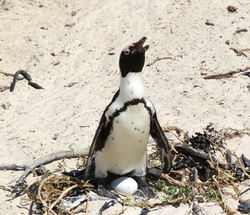 Protecting the egg |  Constantly on guard |
 Alert alert the seagulls are coming |  What a great place to live for both the humans and the penguins! |  The African penguin's coloring is a form of protective coloration known as countershading. The white undersides of the birds are difficult to spot by predators under the water and the penguin's black backs blend in with the water when viewed from above. The sweat glands above the eyes cool the bird's blood and as the temperature rises, increased blood flow causes the glands to get pinker. |
 Harbor Photo |
 The Atlas Trading Company, a family owned and run business, has been selling spices since 1946. It is located in the heart of Bo-Kapp and has both a colorful history and exquisite product line. There's a variety of spices on sale; from well known curries to barbecue mixes and the more exotic spices, such as Methi Kasoori or Sajiera. |  Lots of spices |  Some colorful homes in the Bo-Kapp area. |
|---|
bottom of page